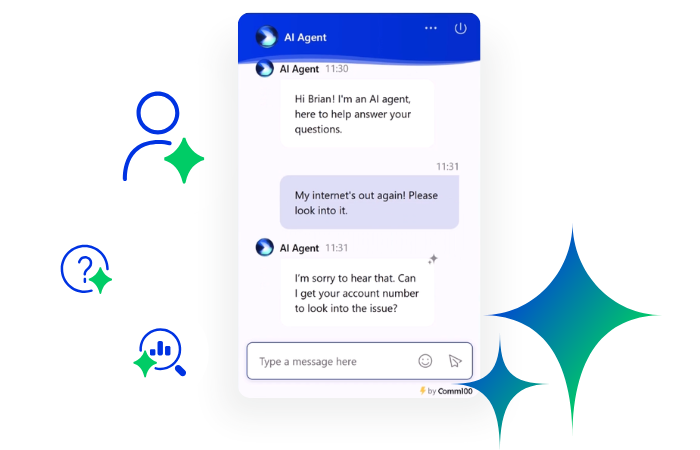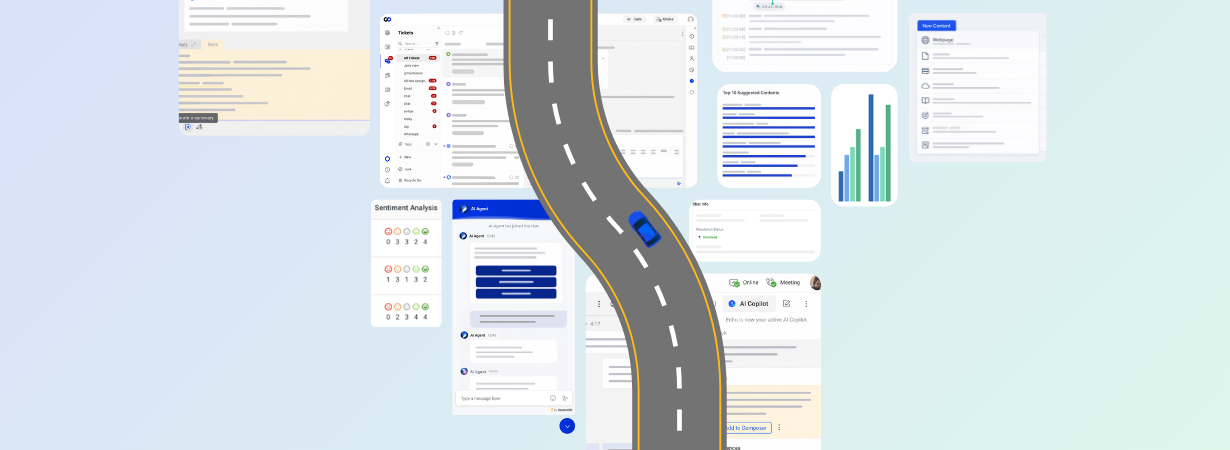Student counseling services face an unprecedented challenge: according to a 2023 survey from the Healthy Minds Network, 41% of college students reported having symptoms of depression, while 36% reported anxiety.
During the 2020-2021 academic year, the majority of college students across the country met the criteria for at least one mental health diagnosis, representing a nearly 50% increase from 2013.
Traditional one-on-one counseling models cannot scale to meet current demand without compromising care quality. In Canada and the United States, there’s been a significant surge in enrolment, especially in undergraduate programs, and student counseling hasn’t been able to keep up.
The U.S. Health Resources and Services Administration projects that by the end of 2025, the demand for mental health professionals will exceed supply by 250,000 full-time providers.
Recent headlines have raised legitimate concerns about generative AI systems like ChatGPT providing dangerous advice on sensitive mental health topics, including suicide and substance abuse.
The AI solutions discussed in this guide operate fundamentally differently; they are purpose-built for educational institutions and designed to enhance professional counseling services, not replace them.
An increasing number of educational institutes are now employing AI in different departments, and when implemented responsibly, it can prove to be highly effective in offering better student counseling infrastructure and access.
When students are in crisis, they need qualified professionals, not algorithms. The AI tools we discuss serve as bridges to connect students with the right human support faster and more efficiently.
This guide explores how institutions can implement AI-powered counseling support solutions that expand access, improve response times, and enable proactive intervention while preserving the human connection essential to effective student support.
The Key Counseling Challenge: Volume vs. Personal Attention
Campus counseling centres face a fundamental tension that distinguishes them from other student services: effective mental health support requires sustained, individualized relationships, yet increasing demand forces many centres toward brief, crisis-focused interventions that prioritize throughput over therapeutic depth.
Mental health counseling effectiveness depends on establishing trust, understanding individual trauma histories, and recognizing cultural factors that influence how students experience and express distress.
The Therapeutic Relationship Imperative
These therapeutic elements cannot be rushed or standardized. A student presenting with anxiety may be dealing with academic pressure, family expectations, financial stress, identity development, or underlying trauma requiring entirely different intervention approaches.
Cultural competency adds another layer of complexity. International students may experience mental health symptoms differently due to cultural stigma around seeking help, language barriers that affect emotional expression, or adjustment challenges that compound underlying conditions.
First-generation college students often carry family pressures and imposter syndrome that require specialized understanding and prolonged support.
Volume Pressures Compromising Care Quality
Current demand patterns force counseling centers into operational models that conflict with therapeutic best practices. Many centers implement session limits, extended wait times, or group-only interventions for conditions that benefit from individual treatment.
Counselors report spending increasing time on crisis management rather than preventive care, creating a reactive system that intervenes after problems have escalated.
Administrative demands further reduce direct therapeutic time. Documentation requirements, coordination with academic departments, and routine scheduling consume hours that could be spent in therapeutic relationships.
Even the medium used can have an impact. For instance, counselors can handle cases more effectively if they have the option to chat online with students. It also enables them to work with more students as compared to meeting with students in-person every time.
How Counselors Can Use AI to Prioritize Critical Cases Without Sacrificing Quality of Care
Mental health triage represents one of student counseling’s most critical skills: identifying which students need immediate intervention against those who can benefit from scheduled appointments or group resources.
AI agents enhance this clinical judgment by providing counselors with comprehensive information and risk assessment data before human contact begins, allowing professionals to make more informed decisions about care prioritization.
Enhanced Initial Screening Through Conversational Assessment
AI agents utilize validated conversational frameworks to conduct initial mental health screenings that gather comprehensive information about student symptoms, risk factors, and immediate needs.
Unlike static intake forms, an AI Agent engages students in natural dialogue that can reveal important clinical details students might not think to mention in traditional paperwork.
For example, a student initially contacting the counseling center about “test anxiety” might reveal through AI conversation that they’re also experiencing:
- Sleep disruption and changes in appetite
- Social isolation and withdrawal from campus activities
- Intrusive thoughts about academic failure and personal inadequacy
The AI can explore these symptoms systematically, asking follow-up questions that help counselors understand symptom severity and potential comorbid conditions before the first appointment.
This enhanced screening allows counselors to review comprehensive background information and arrive at initial sessions prepared to focus on treatment planning rather than basic information gathering.
Risk Stratification Based on Validated Clinical Indicators
AI tools can also help counselors identify concerning language patterns using technologies like sentiment analysis and pattern recognition. These AI systems provide counselors with objective risk assessment data to supplement clinical judgment by analyzing communication patterns and identifying risk indicators.
The system can be used to flag students whose communications contain risk indicators such as hopelessness language, social withdrawal patterns, or expressions of self-harm ideation.
Rather than replacing clinical assessment, these tools provide counselors with additional data points to inform professional decision-making about appropriate levels of care and intervention timing.
Counselors receive alerts about students showing concerning patterns, enabling proactive outreach before crisis situations develop.
This predictive capability allows centers to offer preventive interventions that are less resource-intensive than crisis management while providing better outcomes for students.
Enhance Student Support
Leading universities trust Comm100’s AI Agent to answer routine questions 24/7, freeing staff to engage meaningfully with more prospects.
Book a demo today
Request Demo
Therapeutic Continuity Through Session Support
An AI Copilot can assist counselors during sessions by providing quick access to previous session notes, treatment goals, and progress indicators without disrupting therapeutic flow.
What is an AI Copilot?
An AI Copilot is a real-time, AI-powered assistant that supports customer service agents during live conversations. It helps by retrieving relevant information, suggesting accurate responses, rewriting messages for clarity or tone, and automating repetitive tasks, all within the agent’s workspace.
Rather than counselors needing to review files during appointments or rely on memory across multiple sessions, AI systems can surface relevant context and treatment history seamlessly.
Between sessions, AI systems can maintain therapeutic momentum through check-in messages, homework reminders, and crisis support resources. Students receive consistent support that bridges the gaps between counseling appointments, while counselors receive updates about student progress and any emerging concerns.
Expanding Access While Preserving the Human Connection
AI agents make counseling support available during evening hours, weekends, and campus breaks when human counselors are not accessible. Rather than replacing human counselors, AI systems serve as therapeutic bridges that maintain student connection with counseling services and provide crisis stabilization until professional support becomes available.
Students experiencing anxiety, depression, or crisis situations can receive immediate support and resources, with smooth escalation to human counselors when clinical judgment is required.
Multilingual Support for International Students Around the Clock
As international enrolment continues to rise in North America, institutions must adapt to cater to a diverse population. International students face unique mental health challenges that compound traditional counseling barriers, such as:
- Language limitations during emotional distress
- Cultural differences in expressing psychological symptoms
- Time zone conflicts with family support systems
These students often need immediate assistance outside standard counseling hours when anxiety, homesickness, or academic pressure peaks during late-night study sessions or cultural adjustment difficulties.
AI systems can recognize these language shifts and provide culturally appropriate crisis intervention resources while immediately escalating to human counselors fluent in the student’s preferred language.
Plus, the system maintains context across language transitions, ensuring that critical information shared in the student’s native language is preserved and communicated to counseling staff.
This prevents the therapeutic disruption that occurs when students must repeat traumatic or emotionally difficult information in their second language during counselor handoffs.
Maintaining Cultural Context in Mental Health Assessment
AI agents can be programmed to recognize cultural variations in mental health symptom presentation and help-seeking behaviors. Students from cultures where mental health carries social stigma may initially present with physical complaints or academic concerns rather than directly acknowledging emotional distress.
The AI guides these conversations with cultural sensitivity, allowing students to discuss concerns within familiar cultural frameworks while gradually connecting them to appropriate mental health resources.
This approach respects cultural communication patterns while ensuring students receive necessary support.
How AI Can Detect What Students Aren’t Saying Directly
Many students struggle to articulate their mental health concerns in initial counseling encounters, particularly when working with counselors from different cultural backgrounds or when social anxiety prevents authentic self-expression.
AI interactions remove these social dynamics, allowing students to communicate more authentically about their experiences.
For instance, students frequently present a “functioning” version of themselves during initial counseling appointments, minimizing symptoms or deflecting from deeper concerns. This social performance intensifies when students perceive demographic or cultural differences with their counselors.
AI interactions capture information students might hesitate to share directly:
- Significant trauma histories and substance use patterns
- Family conflicts
- Financial stress details
- Identity-related concerns affecting mental health
Overcoming Cultural and Identity-based Communication Barriers
Students from collectivist cultures may frame individual mental health concerns through family obligations rather than personal emotional experience. LGBTQIA+ students might discuss identity-related stress indirectly without explicitly connecting these to their orientation or gender identity.
AI-powered student support platforms can recognize these indirect communication patterns and ask culturally responsive follow-up questions, providing counselors with crucial context for understanding how cultural factors influence student presentations and treatment preferences.
Boost Campus Engagement
Discover how Comm100’s AI Agent supports universities by recognizing diverse student needs, helping staff engage more effectively, and strengthening enrolment outcomes.
Request a demo today
Request Demo
Cultural Competency at Scale: AI That Understands Diverse Backgrounds
Training human counselors in cultural competency requires ongoing education, supervision, and lived experience that institutions struggle to provide comprehensively across all student populations.
AI agents can be trained with extensive cultural knowledge bases and therapeutic approaches that account for diverse worldviews, communication styles, and help-seeking behaviors.
Addressing Mental Health Stigma Across Cultures
Different cultural groups approach mental health disclosure through varying frameworks. Students from East Asian backgrounds may present somatic complaints rather than emotional distress due to cultural taboos around psychological vulnerability.
Latino students might frame individual struggles within family system contexts, requiring different therapeutic entry points than individualistic approaches.
Comm100’s AI agent can adapt its conversational approach based on cultural indicators, offering culturally congruent pathways for students to explore mental health concerns.
Beyond basic translation capabilities, it can recognize cultural variations in emotional expression and metaphorical language.
Students may describe depression through cultural idioms, family relationship dynamics, or academic performance concerns that require cultural context for accurate interpretation. The technology identifies these culturally specific expressions and enables counselors to adopt interpretive frameworks that help bridge cultural understanding gaps.
Maintaining Continuity of Care
Therapeutic continuity suffers when counselors struggle to track complex cases across multiple sessions, remember specific student preferences, or maintain consistent communication tone with diverse student populations.
Using an AI Copilot can help address these continuity challenges by providing real-time session support and comprehensive case management that enhances rather than replaces clinical decision-making.
For instance, it can work alongside counselors during their sessions, instantly surfacing relevant student history, previous session notes, and recommended interventions based on the current conversation.
When a student mentions academic stress, for example, the AI Copilot can immediately pull up their course load, recent grade changes, and any previous discussions about academic pressure, allowing the counselor to provide more informed, personalized support.
Intelligent Session Documentation
Comm100’s AI Copilot analyzes counseling sessions to generate comprehensive notes that capture therapeutic goals, interventions used, student responses, and follow-up recommendations.
Rather than counselors spending post-session time on documentation, the system produces detailed notes that counselors can review and edit for accuracy.
The technology tracks therapeutic progress across sessions by identifying:
- Recurring themes and behavioral patterns
- Measurable progress toward established therapeutic goals
- Any concerning developments
- Effective intervention strategies
Personalized Follow-ups
The AI also suggests personalized check-in messages that reflect each student’s cultural background, communication style, and current treatment goals.
For students requiring frequent contact between sessions, AI generates contextually appropriate messages that:
- Reference specific coping strategies
- Acknowledge cultural events or stressors
- Provide encouragement using language patterns
- Alert counselors when student responses indicate escalating concerns
Enhancing Therapeutic Empathy through Contextual Awareness
The Comm100 AI Copilot provides counselors with real-time access to student background information, previous session themes, and cultural considerations without disrupting therapeutic flow. This instant access enables counselors to demonstrate understanding more effectively by referencing:
- Specific student concerns mentioned in earlier sessions
- Family dynamics and relationship patterns affecting current functioning
- Academic challenges and career-related stressors
- Cultural factors influencing symptom presentation and treatment preferences
The system prevents therapeutic ruptures that occur when students feel unheard or forgotten, particularly benefiting counselors managing large caseloads.
Leveraging AI to Strengthen Counselor-Student Relationships
The counseling profession exists because human connection, empathy, and clinical expertise cannot be replicated by technology alone. Every counselor entered this field to support students through their most vulnerable moments, to provide the understanding and guidance that transforms lives during critical developmental periods.
This calling remains as essential today as ever, even as the demands on counseling services have reached unsustainable levels.
Comm100’s AI platform addresses this challenge by handling routine tasks, cultural barriers, and continuity issues that currently consume counselor time and energy.
The technology preserves what matters most in counseling work: the therapeutic relationship, clinical judgment, and personalized intervention that only trained professionals can provide.
Experience Comm100 Today
Deliver fast, cost‑efficient support and free your counselors to focus on high‑value interactions with Comm100’s AI platform.
Request a demo today
Request Demo







